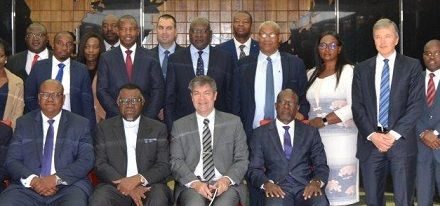
Govt committed to promote local ownership – Proposes changing the status quo of state ownership in mining sector

The Minister of Mines and Energy, Hon Tom Alweendo has asserted the government’s commitment to boost the economy through local ownership and changing the status quo of state ownership in all mining companies and petroleum production in the industry.
Alweendo made these remarks while addressing lawmakers of the Parliamentary Standing Committee on Economics and Public Administration at a workshop held at the Seaside Hotel and Spa in Swakopmund.
“We are making a case that local ownership must start with the state, in whose ownership of our natural resources is vested. The proposed state ownership should take the form where the state owns a minimum equity percentage in all mining companies and petroleum production for which it does not have to pay. We believe that this is the most practical way to resolve the issue of local ownership,” he affirmed.
Subsequently, he mentioned that the purpose of this is to ensure that the two sectors continue to economically benefit citizens while revealing that the sector’s status quo is untenable and indefensible.
“There is a growing public voice criticizing the fact that the exploitation of our mineral and petroleum resources is dominated by foreigners. I wholeheartedly agree with this view – and I may add that the status quo is untenable and indefensible. We, therefore, need to figure out how to change the status quo while ensuring that the two sectors continue to be economically beneficial to the Namibian people,” he said.
He said that two key things have contributed to the status where both the mining and petroleum sectors are dominated by foreign investors.
“First is the fact that operating in these sectors requires complex technologies, and secondly it is capital intensive. These are two things that we unfortunately do not have or so we think. It is only those who have access to risk capital that have ventured to invest in these sectors. I am not mentioning this to justify the status quo. However, I am mentioning it so that we have a better appreciation of what we might have to do to change the status quo.
He further noted that for Namibia to economically benefit from its minerals and petroleum resources, two main phases must occur.
“The first phase relates to finding the resources, generally called the exploration phase. The second phase is the actual recovery of the resources from the ground once discovered through exploration. It is only during the second phase that we derive economic benefits from our minerals
and petroleum resources; it is only during this phase that the state receives resource revenue and can create employment opportunities,” Alweendo told parliamentarians at an oversight workshop this week.
As a move to change the status quo, the minister said the government needs to have the necessary capability, the right technology, and the requisite risk capital where they spend money with no promise of finding any resources.
He added: “I am making this point because some amongst us are of the view that, to encourage local ownership, exploration rights for both minerals and petroleum should be awarded without due regard to the capability to do exploration. They pontificate and point out that it is the only way local businesspeople can participate in these sectors of our economy.”
Furthermore, Alweendo used the opportunity to reiterate his point on the status quo and admittedly concurred that there is something “inherently wrong” where the ownership in the two sectors of Namibia’s economy is dominated by foreigners.
Alweendo argued the viewpoint that awarding exploration rights to those without the necessary capability, in the ministry’s view, is tantamount to denying citizens the potential economic benefits while he maintained that this has the potential to lead to unethical behaviour from not only the officials responsible for licensing, but also from those who are being licensed.
As a result, he said that if exploration licenses could be awarded to anyone who applies for them, it would create a situation where there are more applicants than there are opportunities.
He also said that his ministry has empirical evidence that those awarded exploration rights without the requisite capability to do exploration have created a trading market for such rights selling the rights to the highest bidder, usually a foreigner.
“This is tantamount to auctioning exploration rights, except that the revenue so derived does not accrue to the state, but to the few individuals who were lucky enough to acquire such rights,” he added.
“Another idea we have how to incentivize local ownership is to establish a state-funded minerals exploration Fund, which could be funded by a portion of the royalties that mining and petroleum companies pay to the state,” he stated, adding the Fund will then be used to assist eligible local entrepreneurs who wish to invest in the mining sector.












































